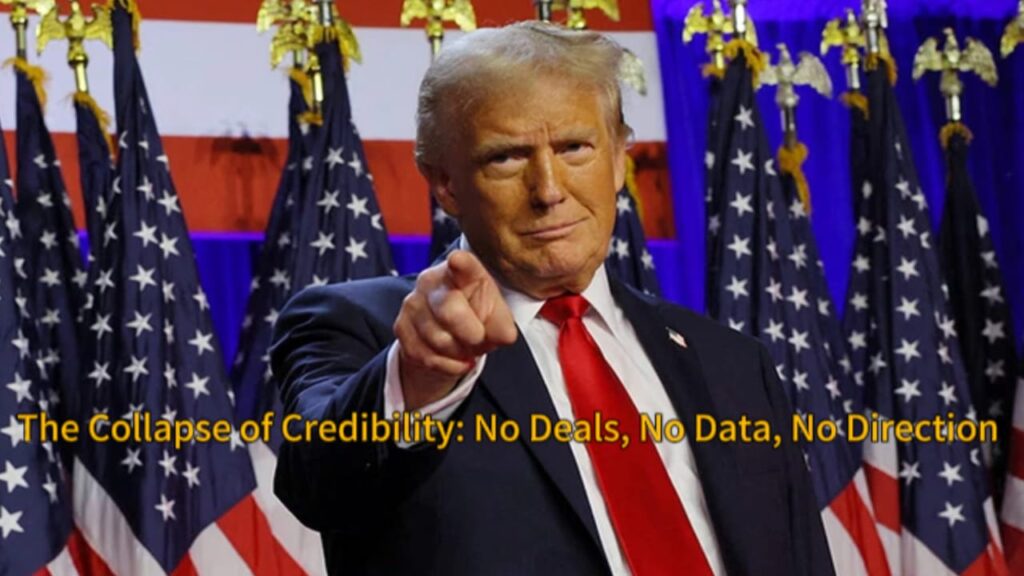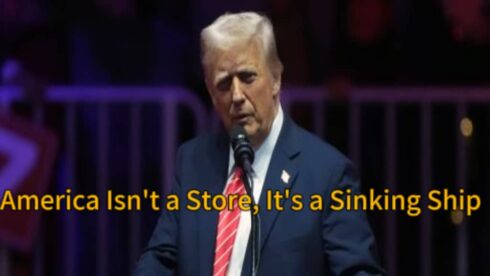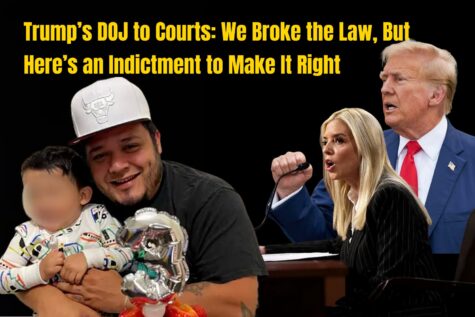Donald Trump began his latest press conference with a tirade that left economists and political analysts alike baffled. “I’m the shopkeeper and I keep the store!” he proclaimed, comparing the U.S. economy to a luxury boutique. As absurd as the metaphor is, it distracts from the grim economic data: soaring inflation, plummeting job creation, and weakened consumer confidence. Trump’s assertion comes amid the steepest economic downturn in over a decade, largely exacerbated by his erratic trade policies and crippling tariffs.
The imagery of a glitzy storefront only underscores the disconnect between Donald Trump’s fantasy and Americans’ reality. With layoffs mounting and small businesses shuttering under rising import costs, experts warn that his fixation on optics is a dangerous deflection. If the United States is indeed a store, as Trump imagines, then it’s one being looted from within by misguided policy and narcissistic delusion.
Tariff Tantrums and Foreign Policy Fantasies
Donald Trump claims he’s ready to announce 100 international “deals”—but provides zero evidence.
During the same chaotic briefing, Trump responded to a reporter’s question about foreign agreements by boasting, “I could announce fifty to a hundred deals right now.” Yet, he offered no specifics, no timelines, and no partner nations. His statement, like many others, was steeped in hyperbole—designed more to project power than inform policy. With his approval ratings nosediving, Trump appears increasingly desperate to manufacture political wins, regardless of their basis in reality.
Economists and diplomats agree: Trump’s trade strategy lacks structure, substance, and accountability. Rather than forging real agreements, the administration has been hemorrhaging alliances, alienating trading partners, and undermining multilateral frameworks. The so-called “deals” remain as mythical as the booming economy Trump still insists exists.
The Collapse of Credibility: No Deals, No Data, No Direction
Donald Trump’s grandstanding around phantom deals illustrates a broader issue: the absence of functional governance. Last week, he bragged about completing “200 deals,” yet neither the Department of Commerce nor the State Department has been able to confirm a single signed agreement. The discrepancy between Trump’s declarations and documented facts has become so glaring that even conservative commentators are sounding alarms.
This pattern of baseless announcements followed by silence is becoming a hallmark of Trump’s economic stewardship. The American public is left grasping at smoke while tariffs, instability, and distrust fracture the foundations of international trade. Without tangible results, Trump’s rhetoric is nothing more than performative gaslighting.
A Dangerous Fantasy: America Is Not a Retail Chain

By describing the U.S. as “one of Bernard Arnault’s stores,” Donald Trump not only romanticizes global capitalism but fundamentally misunderstands the role of a sovereign economy. Unlike a boutique, a national economy cannot thrive on exclusivity, arbitrary price tags, or celebrity endorsements. Trump’s analogy is not just tone-deaf—it’s economically illiterate. The strength of a national economy lies in stability, production, cooperation, and investment, not prestige branding.
Moreover, his praise for billionaires and foreign luxury moguls amid domestic financial despair demonstrates how out of touch his administration remains. As Americans face increased mortgage rates, job insecurity, and dwindling savings, Trump fixates on the aesthetics of wealth while sidestepping the substance of governance.
The Real Cost of Donald Trump’s Tariffs: Inflation, Layoffs, and Market Mayhem
Under Trump’s watch, tariffs have shifted from a strategic tool to a blunt weapon, aimed haphazardly at friends and foes alike. The result? A contracting manufacturing sector, consumer price inflation, and retaliatory tariffs that punish American exporters. Even Trump’s former economic advisers have warned that the current trajectory is unsustainable and potentially recession-inducing.
Instead of revising failed policies, Trump doubles down with delusions of economic conquest. The “beautiful store” he refers to is stocked with overtaxed imports, unaffordable staples, and goods priced out of reach for everyday Americans. The long-term consequences of this trade war—reduced competitiveness, fragmented supply chains, and investor skepticism—could take years to undo.
Donald Trump’s Presidency: Bluster in Place of Policy With no plan, no allies, and no economic vision, Trump spins fiction as governance.
As Trump’s tenure unfolds, one thing becomes unmistakably clear: there is no coherent economic strategy guiding his administration. Every press conference, including the most recent, devolves into a spectacle of misdirection and self-aggrandizement. Trump continues to blur the lines between politics and performance, trading sound economic policy for sound bites that generate headlines but not results.
Behind the curtain of bombast lies a trail of broken promises and vanishing prosperity. The so-called “greatest store in the world” is hemorrhaging trust, both at home and abroad. If Trump is the shopkeeper, then it’s clear the shelves are bare, the receipts are forged, and the customers are walking out—never to return.














